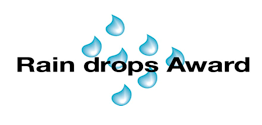/regions/political
Political
Water Jobs via DevNetJobsIndia.org dated October 06, 2010
Posted on 06 Oct, 2010 10:22 AM- Publication and Documentation Officer
Watershed Organisation Trust (WOTR)
Location: Pune
Last Date: October 16, 2010
Raindrops Award- The Best Photographs on the Advantages of the use of Rainwater Geneva Award 2011
Posted on 05 Oct, 2010 03:52 PMContent and Image Courtesy: The Thirsty Planet

National Water Academy training programme on Hydrological Review of Existing Projects, Pune
Posted on 05 Oct, 2010 01:50 PM
Organizer: National Water Academy (NWA)
Description:
National Water Academy (NWA) is a training institution of the Ministry of Water Resources, Government of India. NWA conducts training programs that cover all aspects of water resources development and management at basin scale, viz. hydrology, hydrometry and telemetry; flood management; investigation, planning and formulation of river valley projects; environmental and social aspects of river valley projects; design of dams /barrages /canals /gates/ hydro-power structures and FEM; dam safety and instrumentation; GIS and Remote Sensing; Hydro-informatics; IWRM; Water Policy; etc.
National Water Academy training programmes now open to Indian citizens
Posted on 04 Oct, 2010 03:13 PM

National Water Academy (NWA) is a training institution of the Ministry of Water Resources, Government of India. NWA conducts training programs that cover all aspects of water resources development and management at basin scale, viz. hydrology, hydrometry and telemetry; flood management; investigation, planning and formulation of river valley projects; environmental and social aspects of river valley projects; design of dams /barrages /canals /gates/ hydro-power structures and FEM; dam safety and instrumentation; GIS and Remote Sensing; Hydro-informatics; IWRM; Water Policy; etc.
Surveying, Mapping, Geographical Information Systems and Global Positioning Systems - A Civil Engineering Course under the National Programme on Technology Enhanced Learning
Posted on 02 Oct, 2010 08:37 PMThis Civil Engineering Course under the National Programme on Technology Enhanced Learning (NPTEL) on the broad subject of Surveying, Mapping, Geographical Information Systems and Global Positioning Systems is being carried out by Indian Institute of Technology’s and the Indian Institute of Science, Bangalore as a collaborative project supported by the Ministry of Human Resource Development (Government of India) to enhance the quality of engineering education in the country, by developing curriculum based video and web courses. In these web based lectures, the authors have developed the subject in detail and in stages in a student-friendly manner. The broad group of Surveying, Mapping, Geographical Information Systems and Global Positioning Systems is structured into modules on the following topics:
Multi stage aerobic bio reactor for sewage treatment
Posted on 01 Oct, 2010 10:13 PMAbout CAT “MAR” (Multi Stage Aerobic Bio Reactor)
This reactor was developed with the aim to overcome the main problem associated with SBR, MBR & FABBR, i.e.,
- The plugging & clogging of filter and
- Wash out microbes from the reactor
The First Indian Biodiversity Congress (IBC) 2010, CISSA, Thiruvananthapuram
Posted on 01 Oct, 2010 02:04 PMIndian Biodiversity Congress (IBC) 2010
Theme: Biodiversity and Development: Mainstreaming Biodiversity into Policy-Making
Floods - News Roundup (24-30 September 2010)
Posted on 01 Oct, 2010 12:07 PM- The news earlier in the week still reports of flood fury in different parts of North India such as Haryana, Punjab, Uttar Pradesh, Bihar, Hyderabad, Delhi, Agra. However, in the later part of the week, the flood situation seems to be easing in most parts of the North such as Punjab, Haryana, Himachal Pradesh, Uttaranchal except in Uttar Pradesh, especially western, where the situation still continues to be grim.
Analysis of the UN General Assembly's Resolution on Right to Water and Sanitation
Posted on 30 Sep, 2010 06:47 PMThe historic UN General Assembly Resolution declaring Water and Sanitation as a Right, was passed on the 28th July 2010.
What is surprising is the complete silence to this UN Resolution from some of the countries who have been traditional champions of human rights, in terms of celebrating it as a historic achievement in advocating a basic right to water and sanitation. Instead some of them went one step short of openly opposing and vetoing the UN Resolution and have heaped criticism on Bolivia for tabling this UN Resolution.